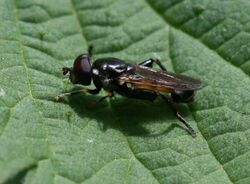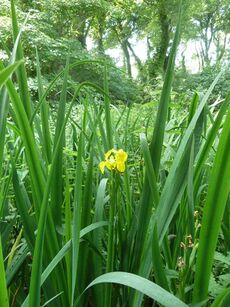Biology:Tropidia scita
| Tropidia scita | |
|---|---|

| |
| Scientific classification | |
| Domain: | Eukaryota |
| Kingdom: | Animalia |
| Phylum: | Arthropoda |
| Class: | Insecta |
| Order: | Diptera |
| Family: | Syrphidae |
| Subfamily: | Eristalinae |
| Tribe: | Milesiini |
| Genus: | Tropidia |
| Species: | T. scita
|
| Binomial name | |
| Tropidia scita (Harris, 1780)[1]
| |
| Synonyms | |
Tropidia scita is a common Palearctic species of hoverfly associated with wetlands, ponds and ditches. The larvae have been recorded living in the basal sheaths of Typha.[5]
Description
External images For terms see Morphology of Diptera
Wing length 5.5–8.25 millimetres (0.217–0.325 in). Vein R4+5 is only slightly dipped into the underlying cell. Thorax dorsum shining black with some dusted parts. Tergites 2 and 3 yellow or orange with a black median stripe. Antennae dark, brown or black. Hind femora swollen and curved. See references for determination.[6][7][8][9]
Distribution
Palearctic Fennoscandia South to central France. Ireland East through Central Europe and then through Russia and the Caucasus. On to Siberia and the Russian Far East. Japan. Formosa.[10][11]
References
- ↑ 1.0 1.1 Harris, M. (1780). An exposition of English insects. Decads III, IV. London: Robson Co.. pp. 73-99, 100-138, pls. 21-30, 31-40. https://www.biodiversitylibrary.org/item/226006#page/5/mode/1up. Retrieved 16 July 2021.
- ↑ Fallen, C.F. (1816). Syrphici Sveciae. Lundae [= Lund]: Berlingianis. pp. 1-14.
- ↑ Macquart, P.J.M.. Insectes diptères du nord de la France. Syrphies.. 1829. Lille: "1827". pp. 223 pp., 4 pls. https://www.biodiversitylibrary.org/item/250269#page/9/mode/1up. Retrieved 16 July 2021.
- ↑ Curtis, J. (1832). British entomology : being illustrations and descriptions of the genera of insects found in Great Britain and Ireland: containing coloured figures from nature of the most rare and beautiful species, and in many instances of the plants upon which they are found. 9. London: Privately published. pp. 398-401.
- ↑ Stubbs, Alan E.; Falk, Steven J. (1983). British Hoverflies: An Illustrated Identification Guide. British Entomological & Natural History Society. pp. 253, xvpp.
- ↑ Van Veen, M. (2004) Hoverflies of Northwest Europe: identification keys to the Syrphidae. 256pp. KNNV Publishing, Utrecht.addendum
- ↑ Van der Goot,V.S. (1981) De zweefvliegen van Noordwest - Europa en Europees Rusland, in het bijzonder van de Benelux. KNNV, Uitgave no.32: 275pp. Amsterdam.
- ↑ Bei-Bienko, G.Y. & Steyskal, G.C. (1988) Keys to the Insects of the European Part of the USSR, Volume V: Diptera and Siphonaptera, Part I. Amerind Publishing Co., New Delhi. ISBN:81-205-0080-6.
- ↑ Coe, R.L. (1953) Diptera: Syrphidae. Handbks.ident.Br.insects, 10(1): 1-98. R.ent.Soc.London. pdf
- ↑ Fauna Europaea
- ↑ Peck, L.V. (1988) Syrphidae. In: Soos, A. & Papp, L. (eds.) Catalogue of Palaearctic Diptera, 8: 11-230. Akad.Kiado, Budapest.
Wikidata ☰ Q2748214 entry
 |


